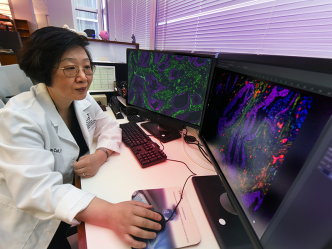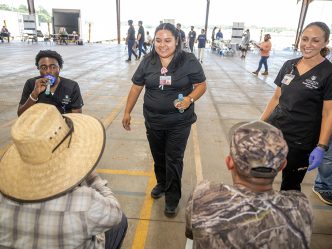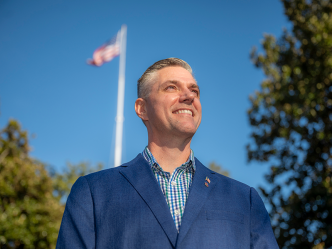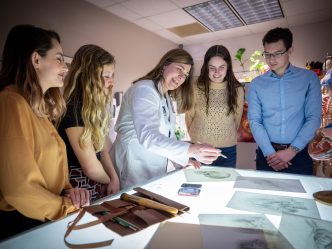Accompanied by their faculty mentors, four physics majors — Garrett Zills, Andrew Vincent, Andrew Zimmerman and Richard Baker — recently gave talks at the American Physical Society March meeting in Chicago. This annual meeting was attended by thousands of physicists, scientists and journalists worldwide.
Baker won a Best Research Presentation Award for his talk.
The students received translational research funding and support from the Center for Undergraduate Research and Scholarship to attend. As the biggest conference of the nation that focuses on physics, over 12,000 physicists presented more than 10,000 technical papers.
Zills is an outstanding student who has not only excelled in his coursework, but also in research. Thanks to his success in presenting his research to faculty at the Medical College of Georgia, he earned a student research award to attend the APS meeting.
Initially recruited to do research by Dr. Trinanjan Datta, professor of physics, Zills was introduced to Dr. Abdul Malmi Kakkada, assistant professor of physics, after being trained for about half a year on python coding. The trio’s efforts led to a presentation at the APS and the preparation of a research article, “Role of time dependent single cell stiffness change in collective behavior of tumor invasion,” which has already been submitted for publication to Physical Review E and is now under peer review.
In the summer of 2021, Zills participated in CURS’s Summer Scholars Program. This summer, he will continue to earn more research experience at the University of Colorado at Boulder.
In addition to his achievements in research, Zills is a scholarship recipient of the Department of Energy’s Workforce Opportunities in Regional Careers programs. He also received the Promoting Opportunities and Pathways for Undergraduate Persistence in STEM scholarship, funded by the National Science Foundation.
A double-major in mathematics, Vincent has also been awarded scholarships and honors. At the College of Science and Mathematics‘ recent Honors Night ceremony, he received the Best Undergraduate Research in Theoretical Physics Award. He has also been awarded both a Georgia Power Scholarship and a nuclear science workforce scholarship.
At the APS March meeting, he presented his research, “Superfluidity of two-component fermions at the vicinity of orbital Feshbach resonance,” which was accomplished under the guidance of Dr. Theja De Silva, associate professor of physics.
When not in the classrooms or research labs, Vincent thrives as a leader who can be found helping others at the tutoring center as a physics tutor or in the Physics Club as its president.
“Andrew Vincent’s pleasant demeanor and altruistic personality make him amicable to others. He is always willing to lend a helping out and has a genuine desire to help others,” De Silva said.
Zimmerman, another one of De Silva’s research pupils, also presented his research, “Effect of cavity-induced long-range interactions between two-component fermions on optical lattices,” at the meeting.
A sophomore with a concentration in nuclear science, Zimmerman’s research focuses on the properties of a theoretical model of a quantum simulator, a system that traps atoms between multiple sets of lasers, creating an optical lattice system. The goal is to alter the system by changing laser intensity and chemical potential to find the parameters needed for a super-conductive topological insulator. This insulator can be useful in various applications, such as quantum computers.
A few weeks after his APS trip, Zimmerman presented similar talks during the Phi Kappa Phi Research and Fine Arts Conference on March 30 at Augusta University.
Richard Baker, an Augusta native, was the first person in his family to go to a four-year college and step into the field of research. During the APS meeting, he received an award for his research on a theoretical and computational physics investigation to understand the behavior of next-generation novel magnetic materials. There were only two awards given per session, and each session had about 20 presenters.
Before building his expertise in physics, Baker had a rocky start to his undergraduate experience. Initially, he enrolled at AU but soon left school to become a full-time manager in the retail industry. He also transferred to a technical school at one point, and then followed his art hobby and took a painting course at the University of South Carolina.
Baker contemplated many education and career paths, but the paths narrowed when he took De Silva’s physics class.
“When I was taking Dr. De Silva’s class, he was really engaged and really passionate about it. His class was inspirational, and sort of opened the door. I ended up making a shift,” Baker said.
“When Richard was taking his first physics class with me during fall 2019, he showed a great deal of interest in physics research. He came up with his own advanced original research problem and asked whether I could advise him on working on the project. His greatest strength is the passion for new ideas and research,” De Silva said.
Deeper down the physics path, Baker met Datta, who trained him in research.
“His mentorship has really pushed me to become extremely invested in this field and confident about my future in it,” Baker said. “I’m grateful.”
Datta has mentored Baker in his research on investigating X-ray angular momentum and polarization behavior in magnetic X-ray scattering for over two years. In collaboration with Dr. Mark Dean of the Brookhaven National Lab in New York, this research focused on an apparent non-conservation of angular momentum.
This research project aims to find novel magnetic materials to keep up with the rapid demand for data storage. Application of energy in the form of electromagnetic radiation can create magnetic excitations in a magnetic compound. Using X-ray and energy X-ray spectroscopy can help characterize it when the structure is on the nanoscale. Baker collected the information based on how the X-ray scatters magnetic spin flips in an atom as it detects nanoscale magnetic interactions.
With the Brookhaven National Lab’s help, Baker has a computational suite running the calculation. It got to a point where they could reproduce this signal. One of the challenges was that he had to do these calculations by hand to understand the fundamentals.
Another challenge came up when preparing for the APS March meeting; Baker had to narrow everything in his two-year research project into a 10-minute PowerPoint presentation. For that, Baker was grateful to Zills, who helped him practice his presentation. He attributed his award to support from his peers and faculty.
The X-ray research has concluded and is on track for publication, but Datta and Baker are looking to start a new research project. Baker looks forward to presenting at APS next year with his peers and their mentors.
“A couple of years ago, I was stocking boxes in some store. And now, I have calculus under my belt, and I’m confident. I’m constantly presenting physics research, and I’m getting acknowledged for it. This is amazing.”
 Augusta University
Augusta University





